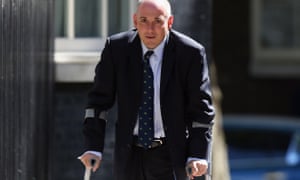
A cross-party committee of MPs has accused the government of failing a generation of children and young people with special educational needs and disabilities (Send) in a damning new report which calls for radical change across the system.
The report, by the education select committee, said ambitious government reforms, introduced in 2014 to improve the experiences of Send pupils and their families, had been poorly implemented with damaging consequences for many.
Children had been left without the additional support they merited, impacting not just on their education but in many cases their mental health. Their beleaguered families, meanwhile, were caught up in a nightmare of “bureaucracy, buck-passing and confusion” in a system which “breeds conflict and despair”.
During the course of the 18-month inquiry, the committee heard from 70 witnesses and received 700 written submissions, among them accounts of children as young as nine attempting suicide while others had suffered anxiety, depression and self-harm.
A significant funding shortfall for children with Send was also highlighted in the report. The government recently announced a £780m increase in local authorities’ high-needs funding for Send, as well as its own review of the impact of the reforms, which were introduced under the Children and Families Act 2014.
MPs warned, however, that any additional money would be wasted unless there was a culture change within the government, schools and local authorities. They went on to criticise a lack of accountability in the system and an “unwillingness to grapple with unlawful practice”.
The report called for a more rigorous inspection framework with clear consequences for failure, and suggested a direct line for parents and schools so they can appeal straight to the DfE where local authorities were not complying with the law.
“The distance between young people’s lived experience, their families’ struggles and ministers’ desks is just too far,” the report said.

MPs recommended a greater focus on Send in school inspections and additional powers for the local government and the social care ombudsman. The report also called for more employment and training opportunities for over-16s.
The Conservative chair of the committee, Robert Halfon, said: “Despite the good intentions of the reforms, many children with Send are being let down day after day. Many parents face a Titanic struggle just to try and ensure their child gets access to the right support.
“The DfE cannot continue with a piecemeal and reactive approach to supporting children with Send. Rather than making do with sticking plasters, what is needed is a transformation, a more strategic oversight and fundamental change to ensure a generation of children is no longer let down.”
Labour’s shadow education secretary, Angela Rayner, described the report as devastating and said it exposed a system on the verge of breakdown. “It is the latest evidence that the most vulnerable children are paying the highest price for this government’s cuts.”
A DfE spokesman said the additional £780m recently announced for Send brought the total amount spent on supporting those with the most complex needs to more than £7bn in 2020/21. “This report recognises the improvements made to the system over five years ago were the right ones, and put families and children at the heart of the process. But through our review of these reforms, we are focused on making sure they work for every child, in every part of the country.”
A wide variety of campaigning organisations supporting families and Send children welcomed the report. Jane Harris, the external affairs director at the National Autistic Society, said: “Autistic young people and their parents will be relieved that MPs have shown they understand the devastating experiences they have been through.
“But being heard isn’t enough. The government must act now to make sure that schools and local authorities have the resources they need to support children properly.”
Kevin Courtney, the joint general secretary of the National Education Union, said: “Schools and local authorities want to provide the best possible support for SEND pupils, but the tools needed are generally no longer available due to cuts to local services.”
The Local Government Association, which represents councils, said: “Councils support the reforms set out in the Children and Families Act in 2014, but we were clear at the time that the cost of implementing them had been underestimated by the government.”
[“source=theguardian”]
